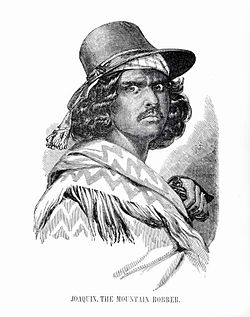Joaquín Murieta
| Joaquin Murrieta Carrillo | |
|---|---|

Artist's portrayal of Murrieta
|
|
| Born | 1829 Sonora, Mexico |
| Died | July 25, 1853 (aged 23–24) Fresno County, California |
| Cause of death | Shooting |
| Residence | California, Sonora, Mexico |
| Nationality | Mexican |
| Other names | The Robin Hood of El Dorado, The Mexican Robin Hood |
| Occupation | Gold miner, outlaw |
| Known for | Outlawry during time period of California Gold Rush |
| Spouse(s) | Rosa Feliz aka Rosita Carmela or Rosita Carmel Feliz |
| Parent(s) | Joaquin and Rosalia (née Carillo) Murrieta |
| Relatives | Jesus Murrieta (elder brother), Antonio Murrieta (brother), Rosa Murrieta (niece), Herminia Murrieta (niece), Anita Murrieta (niece), Ramon Feliz (Father-in-law),Procopio (nephew) |
Joaquin Murrieta Carrillo (sometimes spelled Murieta or Murietta) (1829 – July 25, 1853), also called the Mexican Robin Hood or the Robin Hood of El Dorado, was a famous figure in California during the California Gold Rush of the 1850s. Depending on the point of view, he was considered as either an infamous bandit or a Mexican patriot.
In 1919 Johnston McCulley supposedly received his inspiration for his fictional character Don Diego de la Vega better known as Zorro from the 1854 book entitled The Life and Adventures of Joaquin Murrieta, The Celebrated California Bandit by John Rollin Ridge. John heard about a Mexican miner who had turned to banditry and was intrigued by the story.
Controversy surrounds the figure of Joaquin Murrieta: who he was, what he did, and many of his life's events. This is summarized by the words of historian Susan Lee Johnson:
"So many tales have grown up around Murrieta that it is hard to disentangle the fabulous from the factual. There seems to be a consensus that Anglos drove him from a rich mining claim, and that, in rapid succession, his wife was raped, his half-brother lynched, and Murrieta himself horse-whipped. He may have worked as a monte dealer for a time; then, according to whichever version one accepts, he became either a horse trader and occasional horse thief, or a bandit."
John Rollin Ridge, grandson of the Cherokee leader Major Ridge, wrote a dime novel about Murrieta; the fictional biography contributed to his legend, especially as it was translated into various European languages. A portion of Ridge's novel was reprinted in 1858 in the California Police Gazette. This story was picked up and subsequently translated into French. The French version was translated into Spanish by Roberto Hyenne, who took Ridge's original story and changed every "Mexican" reference to "Chilean" for either nationalistic reasons or to better fit the Chilean market.
...
Wikipedia
